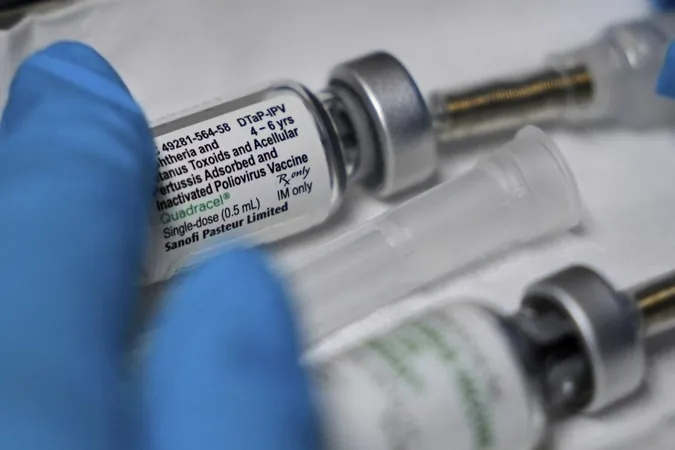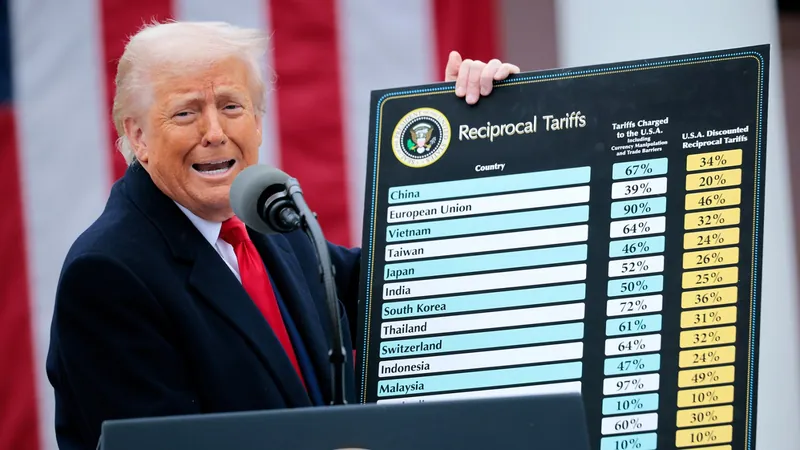
Unseen Tragedy: How Flat Funding Ignited the Texas Measles Outbreak and What It Means for the Future
2025-04-13
Author: Noah
The Measles Crisis: A Preventable Disaster
The alarming measles outbreak in West Texas is not a mere coincidence. Once eliminated in the U.S. in 2000, this easily preventable disease is back, wreaking havoc on Texas communities, largely due to chronic underfunding of health departments that run vital vaccination programs.
A Fragile Immunization Network
Over the years, immunization programs across the nation have faltered under stagnant funding from federal, state, and local governments. While COVID-19 funding provided a temporary boost, it could not compensate for years of neglect. In Texas, this lack of support set the stage not only for the current outbreak but also raises concerns about future outbreaks as fresh federal funding cuts threaten ongoing immunization efforts.
Staggering Statistics: A Cause for Concern
This year alone, over 700 cases of measles have been reported in the U.S., surpassing last year's totals. Texas accounts for more than 540 of these cases, with outbreaks spreading into 23 additional states. The grim reality? Two children in Texas have lost their lives to this preventable disease.
The Worrisome Trend: Declining Vaccination Rates
Despite the requirement for vaccinations for school attendance, an increasing number of parents are choosing to skip immunizations for their children. The exemption rate from vaccine requirements has hit an all-time high, with only 92.7% of kindergartners in 2023 receiving necessary vaccinations—far below the critical 95% coverage required to prevent outbreaks.
A Perfect Storm: Low Vaccination and Funding Drought
The outbreak initially targeted Mennonite communities known for their vaccine resistance but quickly spread to other low-vaccination areas. As these pockets of under-vaccination exist nationwide, health officials warn that they could ignite future outbreaks.
An Unyielding Financial Challenge
In Texas, funding for health departments has not kept pace with the growing population. For instance, Lubbock's annual immunization grant of $254,000—unchanged for at least 15 years—has dwindled in effectiveness, now merely covering limited staff rather than robust outreach and education.
Funding Woes: A Nationwide Issue
The health departments that millions rely upon are primarily supported by two federal programs—Vaccines for Children and Section 317 of the Public Health Services Act. Despite the rising costs of salaries and vaccines, funding for these programs has remained stagnant. A recent CDC report indicated a $1.6 billion funding gap, with Congress approving only $682 million.
Federal Cuts Threaten Vital Services
Recent cuts to federal COVID-19 funding have exacerbated the crisis. With the Trump administration pulling billions for immunization programs, health departments face tough decisions: numerous clinics have had to shut down, and vaccine education initiatives are being abolished.
A Looming Threat: Vaccine Hesitancy on the Rise
As health departments struggle with cuts and the rise of anti-vaccine rhetoric, officials fear that vaccine hesitancy will only grow. This lack of trust could lead to more outbreaks, putting countless lives at risk.
Conclusion: The Path Forward Requires Action
Addressing the issues of funding and vaccine hesitancy must become a top priority. Without immediate measures, the tragic lessons learned from Texas could repeat across the nation, threatening public health on a grand scale.









 Brasil (PT)
Brasil (PT)
 Canada (EN)
Canada (EN)
 Chile (ES)
Chile (ES)
 Česko (CS)
Česko (CS)
 대한민국 (KO)
대한민국 (KO)
 España (ES)
España (ES)
 France (FR)
France (FR)
 Hong Kong (EN)
Hong Kong (EN)
 Italia (IT)
Italia (IT)
 日本 (JA)
日本 (JA)
 Magyarország (HU)
Magyarország (HU)
 Norge (NO)
Norge (NO)
 Polska (PL)
Polska (PL)
 Schweiz (DE)
Schweiz (DE)
 Singapore (EN)
Singapore (EN)
 Sverige (SV)
Sverige (SV)
 Suomi (FI)
Suomi (FI)
 Türkiye (TR)
Türkiye (TR)
 الإمارات العربية المتحدة (AR)
الإمارات العربية المتحدة (AR)